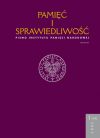Współpraca sowiecko-niemiecka a zbrodnia katyńska
Soviet-German Cooperation and the Katyń Massacre
Author(s): Witold WasilewskiSubject(s): History
Published by: Instytut Pamięci Narodowej
Summary/Abstract: This article re-examines the opinion about wide-ranging cooperation between the Soviet and German systems of repression in organising crimes against Poles in 1939–1941. The author focuses on the alleged German and Soviet cooperation in the murder of Polish prisoners in the 1940 Katyń Massacre. The nature of the relationship between the Third Reich allied with the USSR gave rise to speculation that crimes against Poles, in particular those committed in the spring of 1940, the Katyń Massacre and AB-Aktion, were coordinated. The article points out diverse character of both crimes. Wasilewski challenges the opinion of scholars who treat meetings between representatives of the Third Reich and the USSR as evidence of Soviet-German cooperation in Katyń. Many such meetings took place in the period from the establishment of ally relations in the summer of 1939 until the outbreak of war in June 1941. Contacts between representatives of security services after the end of military operations in Poland in 1939, and before deterioration of German- -Soviet relationships at the end of 1940, were particularly important for the possible transfer of knowledge about Katyń. Meetings were taking place in the capital cities of both states, in frontier towns, e.g. Brest, and towns near the border cordon, e.g. Lutsk, as well as other cities in the occupied Polish territories, inter alia in Lviv, Cracow and Zakopane. The author proved that the meetings attracting the most interest of scholars – those in Cracow and Zakopane – are falsely portrayed in the historiography as NKVD – SS or Gestapo conferences on anti-Polish repressions (Katyń – AB- -Aktion). He organised the knowledge about the meetings – convened in December 1939 and March 1940 – indicated their purpose (people exchange commissions), and concluded that there is no basis to claim that they were devoted to coordination of anti-Polish crimes. Wasilewski states that documentary sources fail to confirm that Russians shared information about Katyń with their ally during any of the meetings. Next, the author presents documents reflecting the state of knowledge in the Third Reich about Poles held captive in the USSR during the period from autumn of 1939 to summer of 1941. The documents, produced by and circulated among German institutions, prove that the Nazis were not aware of the Katyń Massacre neither in the spring of 1940, nor at the moment of the attack on the USSR in June 1941. Finally, the author critically examines reports on the Germans’ complicity in the Soviets’ planning or execution of the murder in Katyń in 1940 and proved them unreliable. In the conclusion the author states that the German side had no knowledge about the Katyń Massacre while it remained an ally to the Soviets.
Journal: Pamięć i Sprawiedliwość.
- Issue Year: 14/2009
- Issue No: 1
- Page Range: 47-70
- Page Count: 24
- Language: Polish

